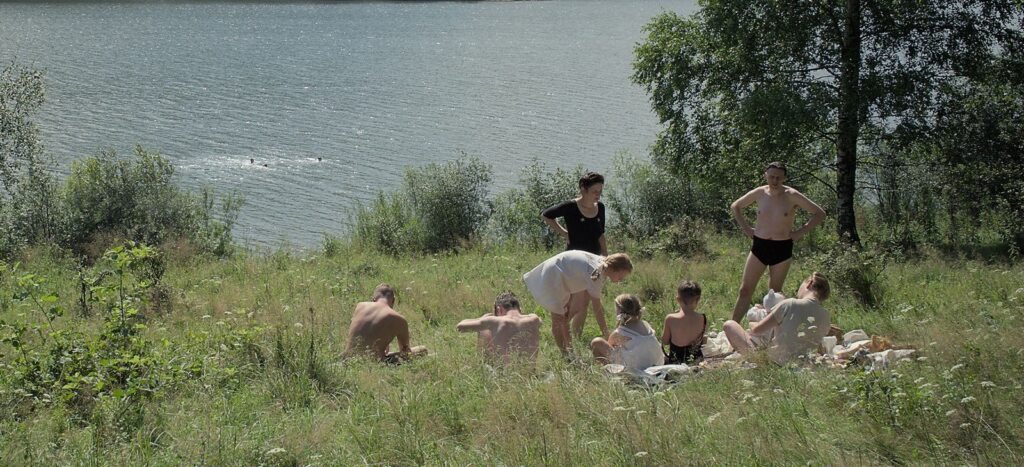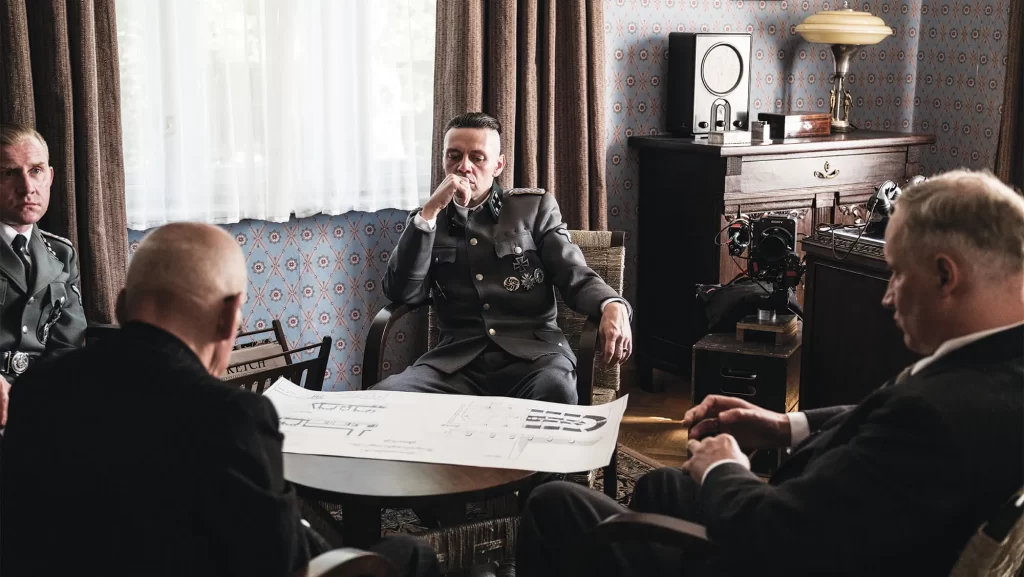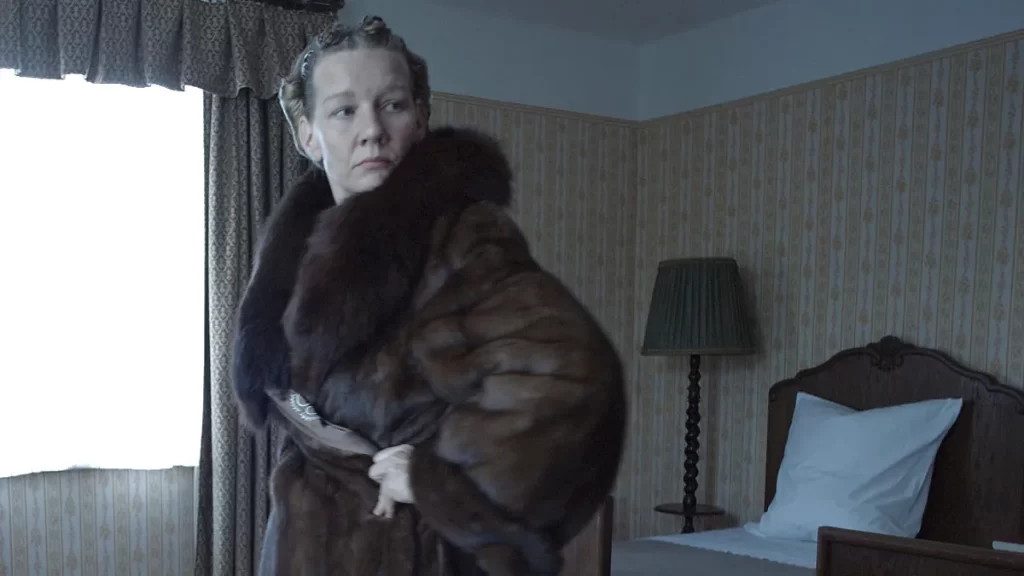
The music speaks the truth. Strip away The Zone of Interest’s first few minutes—a grim overture in which Mica Levi’s doomy, dissonant score aches and seethes against a black screen—and you might suspect that you’ve stumbled into a gentle movie of bucolic bliss. The first image we see is that of a happy-looking family lounging lazily in a meadow. As a stream gurgles nearby, the children traipse along a dirt path, the sun glinting down on their golden hair. Their parents seem entirely relaxed, suggesting a life of comfort and security. Perhaps they’re on vacation, or maybe just enjoying a weekend picnic. Even after they return to their home, a cozy cottage with a carefully tended garden and a small in-ground pool, it takes some time before you pick up on the curious nature of their surroundings: the razor wire atop the large wall in the background, the smoke billowing from distant chimneys, the muffled echoes of gunfire and screams.
Adapted by Jonathan Glazer from a novel by Martin Amis, The Zone of Interest is decidedly a movie about the Holocaust. But it is also not a Holocaust picture—at least, not in the way the subgenre has traditionally been understood. There are no ghastly scenes of extermination, no heroic feats of endurance and survival, no condemnatory speeches, no comeuppance or catharsis. There is simply the pervasive aroma of death, and the people willfully oblivious to its stench.
Glazer is a music-video veteran whose sparse feature career—Sexy Beast, Birth, the Scarlett Johansson vehicle Under the Skin—has produced films that vacillate from beguiling to maddening. The Zone of Interest is neither of those things, though its aesthetic exactitude might fairly be called beautiful, in a pitiless sort of way. Yet it doesn’t waver in the slightest. To the contrary, its austerity is unshakable—a product of bone-deep commitment and extraordinary structural rigor.

The patriarch of our aforementioned merry family is Rudolf Höss (Christian Friedel), the chief architect of the Auschwitz concentration camp. Every morning, he puts on his black boots, affixes his swastika armband, and makes the short commute by foot from his house to his neighboring office, where he impassively supervises genocide. It is crucial to the movie’s thematic integrity that the camera never, ever follows Höss inside those terrible concrete walls. Instead, The Zone of Interest imagines a place where mass murder is just on the horizon, always heard but never seen. The film’s central setting is thus not the camp but the house—a dwelling of careless luxury and contentment where men drink, women swan, and children frolic. It is located a literal stone’s throw from the prison, even if it is also a figurative world apart.
The fidelity with which Glazer adheres to this blueprint is formidable. The much-discussed sound design is a marvel of unsettling minimalism; there are no bursts of mayhem, only the quiet, steady rumble of distant atrocity. With the help of cinematographer Lukasz Zal, who previously shot the dazzling duo of Ida and Cold War for Pawel Pawlikowski, Glazer crafts images of haunting mundanity, as when Höss stands confidently in his yard while in the background a smokestack belches human remains. The atmosphere is not quite as clinically cold as the works of Michael Haneke (whom Friedel collaborated with in The White Ribbon), but it is undeniably dispassionate, as though Glazer is documenting the day-to-day lives of monsters with humdrum efficiency.

Glazer’s decision not to depict any Jewish characters in the film may be inflammatory, but it doesn’t mean the people on screen are oblivious to the Holocaust. Rather, the Germans whom we do meet—most memorably and loathsomely embodied by Höss’ wife, Hedwig (a terrifying Sandra Hüller)—react to the ongoing massacre with a nauseating combination of opportunism and annoyance. And so, we see Hedwig donning a mink that was plainly confiscated from a female prisoner; later, her mother (Imogen Kogge), visiting for a cheerful spell and admiring the garden, laments that she’d hoped to snag a certain pair of curtains from a Jewish neighbor’s house, only for a rival to outbid her. We often use the phrase “banality of evil,” but it’s hard to think of a more chilling example than when Hedwig explains to her friends that once she learned Jews were smuggling diamonds into their toiletries, she requisitioned additional tubes of toothpaste.
How can you even process such ghastly behavior? It’s easy enough to perceive The Zone of Interest as an urgent warning of the future as well as an acid chronicle of the past, not least when the presumptive Republican nominee for president is spouting fascist rhetoric about “vermin” who are “poisoning the blood of our country.” Yet Glazer’s filmmaking concerns are less allegorical than logistical. Early on, Höss gathers with subordinates in his home to discuss newly designed gas chambers, and the meeting is cordial and efficient, as though they’re simple builders plotting the next phase in a construction project. Later, after he’s recalled to Germany, Höss gives a presentation in a conference hall, complete with binders containing agendas and bullet points; nudge the time period forward by a century, and you can imagine him cycling through PowerPoint slides on a projector. The overall mood is one of workmanlike problem-solving, and Glazer’s observational method is similarly calm, even mathematical. He maps the geometry of genocide with Euclidean precision.

To the extent The Zone of Interest possesses a plot beyond its overarching premise, it involves exploring the marriage between Höss and Hedwig, which is warm but not exactly rapturous. Höss envisions himself a decent family man—he reads bedtime stories to his children and makes playful jokes with his wife—though that doesn’t stop him from periodically raping young women. (Naturally, the one assault we bear witness to is implied rather than displayed.) For her part, Hedwig seems less attached to her husband than to his position and the blissful existence it affords her in Auschwitz. “We need to leave,” Höss tells her after learning he’s being transferred, to which she responds, “No, you need to leave.” Hüller’s performance is scary for how her character is so inhumane, she can barely even feign empathy; when Hedwig adds, “I’ll miss you, of course,” you can feel the exertion of the pantomime.
In terms of conception and execution, The Zone of Interest is a mighty achievement. I do wonder if it’s anything more than that. In a sense, the movie’s merciless technique is almost redundant—simply the natural consequence of such a nervy and disturbing setup. Perhaps recognizing this, Glazer makes the curious choice of including a few interludes from the perspective of a local Polish girl (Julia Polaczek). These scenes are presented jarringly, with blaring sound and infrared lighting, as though the girl is an alien traversing a hostile planet. It’s certainly a stylistic departure, though the narrative and thematic purpose of her presence is less clear. What is she doing? Why are we seeing her?

Glazer is naturally disinclined to explain himself, even if these sequences add a layer of intrigue that the remainder of the movie emphatically rejects. That isn’t to say The Zone of Interest is simplistic—more that it refuses to embellish the horror of the Holocaust with undue humanity. When Höss attends a grand celebration and reflects that he can only think about “how to gas everyone in the room,” it’s arguably too fine a point on the character, but it also encapsulates his enduring soullessness.
You might object that such a black hole of evil is unworthy of such an exquisitely designed and implemented movie. No matter—The Zone of Interest is too confident a picture to spend time justifying its own existence. Yet in its fascinating final scene, which collapses time and space, it becomes less a docudrama than an object of considerable momentum and force. In striving to comprehend the incomprehensible, it remembers the past with agonizing clarity. And as Levi’s harsh, unsettling score returns, it leaves you to sit in the dark and wrestle with the truth: that no one movie can possibly shoulder the crushing weight of history.
Grade: B+
Jeremy Beck is the editor-in-chief of MovieManifesto. He watches more movies and television than he probably should.
